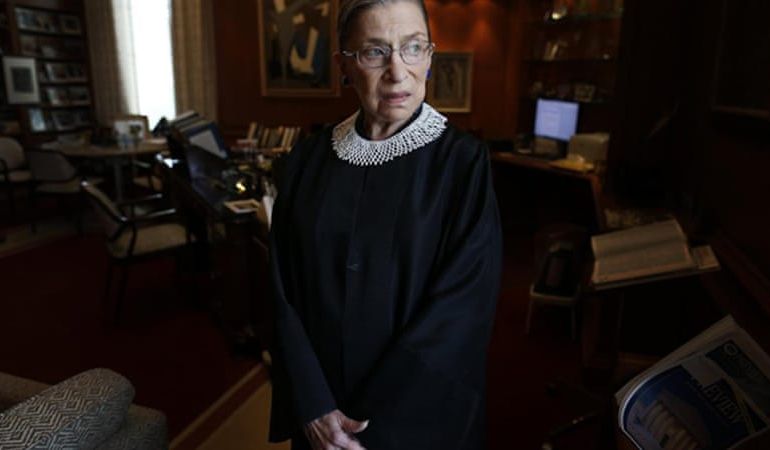Supreme Court’s Ginsburg undergoing chemotherapy for liver cancer
The oldest Supreme Court justice has faced a series of health challenges in recent years.

Justice Ruth Bader Ginsburg, at 87 the United States Supreme Court‘s oldest member, said on Friday she is receiving chemotherapy treatment for a recurrence of cancer, but has no plans to retire from the court.
In a statement released by the court, Ginsburg said a periodic scan in February, followed by a biopsy, revealed lesions on her liver. She said she is tolerating the chemotherapy treatment well and that it is yielding positive results.
Keep reading
list of 4 itemsICC demands end to threats against court amid Gaza war probe
Five takeaways from day 10 of Donald Trump’s New York hush money trial
Abu Ghraib: Iraqi victims’ case against US contractor ends in mistrial
“My most recent scan on July 7 indicated significant reduction of the liver lesions and no new disease,” she wrote. “I am tolerating chemotherapy well and am encouraged by the success of my current treatment.”
|
|
The cancer is the latest in a series of health concerns.
Ginsburg was released from a Baltimore hospital earlier this week. A court spokesperson said at the time it was due to a possible infection.
Ginsburg, who was appointed by President Bill Clinton in 1993, is the senior liberal justice on a court that leans conservative by a 5-4 margin.
Her health is closely watched because a Supreme Court vacancy could give President Donald Trump – a Republican – the opportunity to appoint a third justice to the court and move it further to the right.
Asked earlier this week about a possible opening on the court before the election, White House Chief of Staff Mark Meadows said the president would act quickly if any opening were to arise.
When President Barack Obama tried to fill a vacancy in an election year, Senate Republicans refused to even consider his nominee.
The liberal icon says she remains able to continue her work on the high court.
“I have often said I would remain a member of the Court as long as I can do the job full steam. I remain fully able to do that,” Ginsburg said in the statement.
Ginsburg’s history with cancer goes back more than 20 years. In addition to being treated without surgery for a tumour on her pancreas last year, she also underwent surgery for colorectal cancer in 1999, pancreatic cancer in 2009 and lung cancer in December 2018.
Dr Alan Venook, a pancreatic cancer specialist at the University of California, San Francisco, who is not involved in Ginsburg’s care, told The Associated Press news agency that “clearly, she’s got [an] incurable disease now” because of the spread to her liver.
On average, patients with advanced pancreatic cancer live about a year, but the fact that her disease took so long to recur from her initial pancreatic cancer surgery in 2009 and previous treatments “suggests that it’s not been growing rapidly”, he said.
“She’s above average in many ways,” and has done remarkably well with all her treatments so far, Venook said. “There’s no reason to think she would die imminently.”